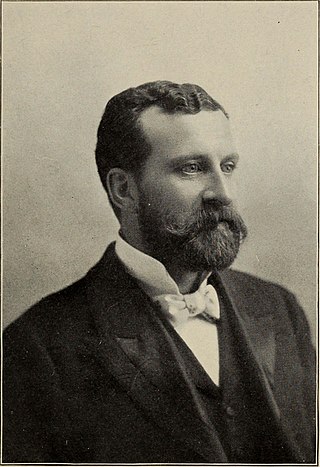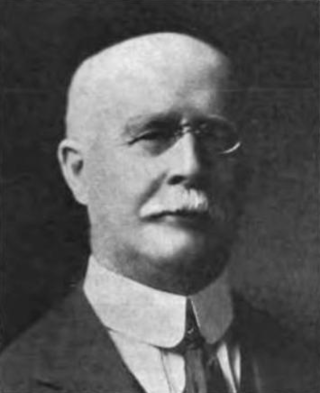
Sir Robert Bond was the last Premier of Newfoundland Colony from 1900 to 1907 and the first prime minister of the Dominion of Newfoundland from 1907 to 1909 after the 1907 Imperial Conference conferred dominion status on the colony. He was born in St. John's, Newfoundland, as the son of merchant John Bond. Bond grew up in St. John's until 1872 when his father died and left the family a good deal of money. He went to England where he was educated and came back to Newfoundland and articled under Sir William Whiteway.

Edward Patrick Morris, 1st Baron Morris was a Newfoundlander lawyer and Prime Minister of Newfoundland.
The 1861 Newfoundland general election was held in 1861 to elect members of the 8th General Assembly of Newfoundland in Newfoundland Colony. 14 Conservatives and 12 Liberals were elected. The results in Harbour Grace and Harbour Main electoral districts were set aside following violence at the polls; members were elected in subsequent by-elections. The Liberal Party led by John Kent was defeated by the Conservatives led by Hugh Hoyles; Ambrose Shea replaced Kent as party leader.
The 1865 Newfoundland general election was held on 7 November 1865 to elect members of the 9th General Assembly of Newfoundland in Newfoundland Colony. The Conservative Party led by Frederick Carter formed the government.

The 1859 Newfoundland general election was held in 1859 to elect members of the 7th General Assembly of Newfoundland in Newfoundland Colony. 18 Liberals and 12 Conservatives were elected. The Liberal Party led by John Kent formed the government.
The 1855 Newfoundland general election was held in 1855 to elect members of the 6th General Assembly of Newfoundland. This was the first election after responsible government was introduced to Newfoundland Colony. The Liberal Party led by Philip Francis Little formed the government.
The 1882 Newfoundland general election was held in 1882 to elect members of the 14th General Assembly of Newfoundland in the Newfoundland Colony. The Conservative Party led by William Vallance Whiteway formed the government.
Alfred Penney, Esq. was a merchant, judge and political figure in Newfoundland. He represented Bay de Verde in the Newfoundland and Labrador House of Assembly from 1878 to 1882 and Carbonear from 1882 to 1889.

The 1874 Newfoundland general election was held in 1874 to elect members of the 12th General Assembly of Newfoundland in the Colony of Newfoundland. The Conservative Party led by Frederick Carter formed the government.
The 1878 Newfoundland general election was held in 1878 to elect members of the 13th General Assembly of Newfoundland in Newfoundland Colony. The Conservative Party led by William Vallance Whiteway formed the government.
The 1885 Newfoundland general election was held on 31 October 1885 to elect members of the 15th General Assembly of Newfoundland in the Newfoundland Colony. The Reform Party had been created by Robert Thorburn on a platform of "Protestant Rights" after supporters of the Orange Order abandoned the Whiteway government after sectarian riots in 1885 against the government's 'denominational compromise'. Whiteway's Conservative Party was destroyed as a result and Whiteway founded a new Liberal Party. Thorburn's new party swept to power but soon turned away from its sectarian agenda by inviting Catholic Liberals into the Cabinet.
The 1889 Newfoundland general election was held on 6 November 1889 to elect members of the 16th General Assembly of Newfoundland in Newfoundland Colony. The Reform Party administration of Robert Thorburn was defeated in favour of the Liberal Party led by William Whiteway formed the government. Reform soon disappeared and was replaced by the Orange Order based Tory Party. This was the first general election held in Newfoundland using the secret ballot.
The 1893 Newfoundland general election was held on 6 November 1893 to elect members of the 17th General Assembly of Newfoundland in Newfoundland Colony. Although the Liberals won the majority of seats, the Tory party filed petitions against 15 elected Liberals and one Independent, James Murray, alleging election irregularities. The results of those elections were set aside by the courts and the candidates were barred from seeking reelection. The Tory Party, led by Augustus F. Goodridge, temporarily holding the balance of power, formed a government in 1894. Once the resulting by-elections had been held, the Liberals regained the balance of power and formed a government led by Daniel J. Greene. Greene's government passed legislation allowing candidates who had been disqualified to seek election again. William Whiteway was reelected in a by-election in early 1895 and became Premier.

Sir Alfred Bishop Morine was a journalist, lawyer and political figure in Newfoundland. He represented Bonavista Bay in the Newfoundland and Labrador House of Assembly from 1886 to 1906 as a Conservative and from 1913 to 1916 as a member of the Fishermen's Protective Union.
The 1908 Newfoundland general election was held on 2 November 1908 to elect members of the 21st General Assembly of Newfoundland in the Dominion of Newfoundland. The seats were split evenly between the Liberal Party and the new Newfoundland People's Party formed by Edward Morris after he resigned from the Liberal government in 1907 and joined with the opposition. Robert Bond, the Liberal leader, asked the Governor William MacGregor to dissolve the assembly. MacGregor refused to do this and Bond resigned as Premier. The Governor asked Edward P. Morris to form a government. The assembly was not able to elect a speaker and, after the Governor was unable to convince the two party leaders to form a coalition government, the house of assembly was dissolved on April 9, 1909.
The 1909 Newfoundland general election was held on 8 May 1909 to elect members of the 22nd General Assembly of Newfoundland in the Dominion of Newfoundland. The Newfoundland People's Party led by Edward P. Morris, having secured a majority, formed the government.
William Charles Winsor was a Canadian mariner and political figure in Newfoundland. He represented Bay de Verde from 1904 to 1908, Bonavista Bay from 1908 to 1913 and from 1924 to 1928 and Bonavista North from 1932 to 1934 in the Newfoundland and Labrador House of Assembly.
Robert George Winsor was a fisherman and political figure in Newfoundland. He represented Bonavista Bay from 1913 to 1924 and Bonavista North from 1928 to 1929 in the Newfoundland House of Assembly as a member of the Fishermen's Protective Union.
Whiteway is an English surname. Notable people with the surname include:

William Henry Cave was a merchant and politician in Newfoundland. He represented Bay de Verde in the Newfoundland House of Assembly from 1919 to 1924.






